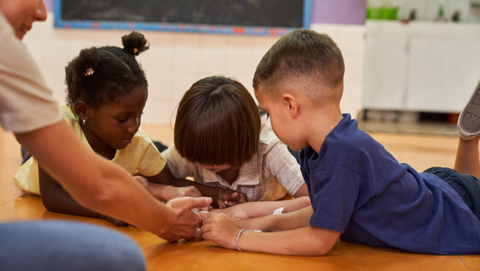Please give us feedback on one of our weekly question and answer articles. We value your time so the evaluation will only take 3 minutes or less, we promise!
Take the Survey »Benefits of Afterschool Programs for Youth with Intellectual and Developmental Disabilities
By Sarah Everitt, USU Extension Intern and Shannon Cromwell, Extension Associate Professor
Youth with Intellectual and Developmental Disabilities (IDD) often struggle with social situations in school, and it can be difficult for them to create healthy social-emotional relationships (Collaborative for Academic, Social, and Emotional Learning, 2022). As a result, children with IDD can feel frustrated or become disruptive. Afterschool programs provide opportunities for youth who may be struggling with social interactions to better understand situations around them and find healthy outlets and coping strategies (Durlak et al., 2011). Below are some key strategies and benefits of afterschool programs.
Benefit 1: Structure and Choice
Providing clear structure, easy to follow rules, and consistency can help to improve social and behavior outcomes, including peer-to-peer social skills, engagement, and concentrated effort (Pierce, et al., 2010). By instituting a choice protocol, youth understand that that they have their own choices to make, but each choice may also carry a consequence. The choices strategy creates accountability and clear expectations and is paired with clear, simple rules based on respect. The choices strategy has been effective for youth with IDD and can help them to thrive with the clear, consistent structure.
Benefit 2: Social-Emotional Learning Lessons
Social-emotional learning (SEL) is the process through which youth acquire the knowledge, attitudes, and skills needed to recognize and manage emotions. SEL lessons help youth demonstrate care and concern for others, establish positive relationships, make responsible decisions, and handle challenging situations constructively (Durlak, et al., 2014; Taylor, et al., 2017). Afterschool programs help youth identify what emotions are and how to regulate them. Lessons focusing on self-control and peer relationship building skills that include interactive activities help connect the ideas and skills for youth with IDD.
Benefit 3: Afterschool Staff-Youth Relationships
Taking steps to build and maintain staff-youth relationships is an important part of afterschool programming. Strategies to build productive staff-youth relationships include knowing and greeting youth each day by their name, listening to their interests, and addressing any questions or concerns they may have. Taking the time to build quality staff-youth relationships results in high-quality programs and high youth participation, especially among youth with IDD (Durlak et al., 2010; Fredericks & Eccles, 2006; Shernoff, 2010).
Conclusion
Youth with IDD can become easily frustrated within school and social settings. When enrolled in afterschool programing they have the opportunity to learn important skills and create lasting peer relationships. Afterschool programs provide structure, social-emotional skills, and adult-youth relationships. These factors are invaluable for all youth, including those with IDD.
Afterschool Resources:
Utah Afterschool Network: https://utahafterschool.org/program-resources/resource-library
Utah Care About Childcare: https://jobs.utah.gov/occ/cac.html
References
Collaborative for Academic, Social, Emotional Learning (2022). https://casel.org/
Durlak, J. A., Domitrovich, C. E., Weissberg, R. P., & Gullotta, T. P. (2014). Handbook of social and emotional learning: Research and practice. Guilford Press.
Durlak, J. A., Dyminicki, A. B., Taylor, R. D., Weissberg, R., & Schellinger, K. B. (2011). The impact of enhancing students’ social and emotional learning: A meta-analysis of school based universal interventions. Child Development, 82(1).
Durlak, J. A., Weissberg, R. P., & Pachan, M. (2010). A meta-analysis of afterschool programs that seek to promote personal and social skills in children and adolescents. American Journal of Community Psychology, 45, 294-309.
Fredericks, J. A., & Eccles, J. S. (2006). Is extracurricular activity participation associated with beneficial outcomes? Concurrent and longitudinal relations. Developmental Psychology, 42, 698-713.
Pierce, K. M., Bolt D. M., & Vandell, D. L. (2010). Specific features of after-school program quality: Associations with children’s functioning in middle childhood. American Journal of Community Psychology, 45, 381-393.
Shernoff, D. (2010). Engagement in after-school programs as a predictor of social competence and academic performance. American Journal of Community Psychology, 45(3 & 4), 325-337.
Taylor, R. D., Oberle, E., Durlak, J. A., & Weissberg, R. P. (2017). Promoting positive youth development through school-based social and emotional learning interventions: A meta-analysis of follow-up effects. Child Development, 88(4), 1156-1171.

